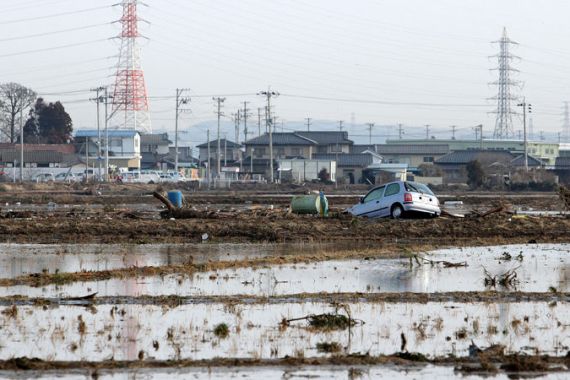Meltdown threat at Japanese reactor
Second blast at quake-damaged reactor adds to tsunami survivors’ fears as tide of bodies washes up on Japanese coast.

A second explosion has rocked a stricken nuclear power complex in Japan, raising concerns over the likelihood of a radiation leak and adding to the humanitarian crisis already facing the country following last week’s massive earthquake and tsunami.
Hundreds of bodies washed ashore on Monday along Japan’s northeastern coastline, the area worst hit by Friday’s tsunami, as crematoriums struggled to keep up with the scale of the tragedy.
| LIVE BLOG |
 |
A Japanese police official said 1,000 bodies were found scattered across the coastline of Miyagi prefecture. Kyodo, the Japanese news agency, reported that 2,000 bodies washed up on two shorelines in Miyagi.
Keep reading
list of 4 itemsLost Futures
Photos: Greek valley that became a lake stirs drought debate
Botswana threatens to send 20,000 elephants to Germany
“We have already begun cremations, but we can only handle 18 bodies a day. We are overwhelmed and are asking other cities to help us deal with bodies. We only have one crematorium in town,” Katsuhiko Abe, an official in Soma, told the Associated Press news agency.
The official death toll from last week’s twin disasters stands at almost 2,000 but many thousands of people are still missing, including some 18,000 in the city of Rikuzen-takata 18.
‘No Chernobyl’
The explosion at Fukushima Daiichi nuclear plant sent a plume of smoke into the air but the International Atomic Energy Agency said on Monday that the reactor had not been damaged. The World Health Organisation said there was a minimal public heath risk.
However the power company that runs the nuclear plant said later on Monday that fuel rods at one of its reactors had become fully exposed again, meaning the water being pumped in to cool the reactors is evaporating due to the heat.
Japanese nuclear officials worked to quell concerns and announced the distribution of 230,000 units of stable iodine. Iodine can be used to help protect against thyroid cancer in the case of radioactive exposure.
Yukio Edano, Japan’s chief cabinet secretary, said that a large-scale radiation leak was unlikely. Edano said the reactor’s inner containment vessel holding the nuclear fuel rods was intact, allaying some fears of the risk to the environment.
Koichiro Genba, the national strategy minister, said there was “absolutely no possibility of a Chernobyl” – a reference to the 1986 explosion at a Soviet reactor which spread radiation over swathes of Ukraine, Belarus, Russia and northern Europe and is estimated by UN agencies to have caused the deaths of thousands of people.
But some people in the affected area said they were worried at the prospects of nuclear radiation. Twenty people have tested positive for radiation exposure and that number looks likely to rise.
‘I am scared’
“I am due to give birth soon, I want to know exactly what is going on at the nuclear plant. I am scared,” said one woman.
The plant operator, Tokyo Electric Power Co [TEPCO], said in a press release that the blast was believed to be a hydrogen explosion at the plant’s No.3 reactor and that 11 workers were injured. The first explosion happened at the same plant on Saturday, at the reactor No. 1.
TEPCO said the impact of radioactive materials to the outside environment is under investigation.
Al Jazeera’s Florence Looi said the cooling system at reactor No. 2 also failed, leading to a build-up of pressure in the containment vessel – the same problem units one and three encountered before they exploded.
Meanwhile, at Fukushima plant, the work to cool the reactors with a mixture of seawater and boric acid continues – an untested method, underscoring the desperate nature of the situation.
Meanwhile, a US aircraft carrier deployed for relief efforts has repositioned after detecting low-level radiation from a malfunctioning nuclear power plants, a US statement has said.
Humanitarian crisis
Foreign aid has begun to arrive and some 70 countries have offered assistance, with help coming not only from allies like the United States but also countries with more strained relations like China.
|
Search intensifies for Japan survivors [Al Jazeera] |
Millions of people spent a third night without water, food or heating in near-freezing temperatures along the devastated northeastern coast.
In many areas there is no running water, no power and four- to five-hour waits for gasoline. People are suppressing hunger with instant noodles or rice balls while dealing with the loss of loved ones and homes.
“People are surviving on little food and water. Things are simply not coming,” Hajime Sato, a government official in Iwate prefecture, said.
Meanwhile, a tsunami alert, which had sparked alarm and local evacuation orders, has been lifted, according to an official in the Fukushima prefecture.
“There is no more fear of a tsunami at this moment, but we will continue to ask our residents to remain vigilant to future advisories,” the official said.
And the Japanese markets, which opened for the first time since the disaster occurred, reacted badly with Tokyo’s Nikkei ending the day down more than six per cent.
Moving quickly to try to keep financial markets stable, the Bank of Japan said it will inject approximately $183bn into the money market to try to bring some stability.